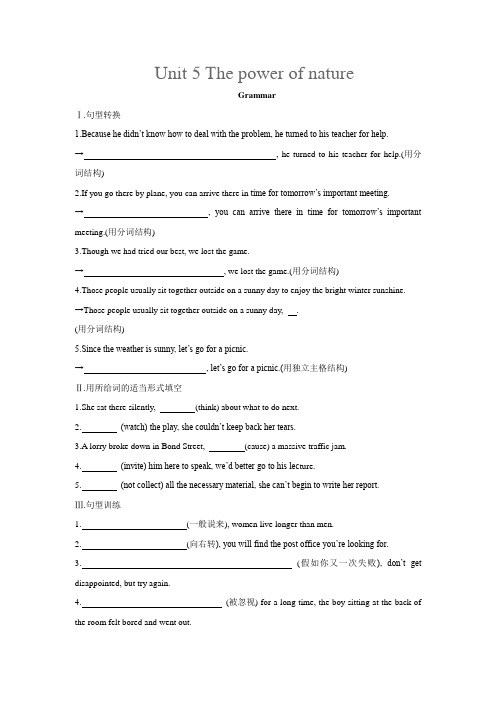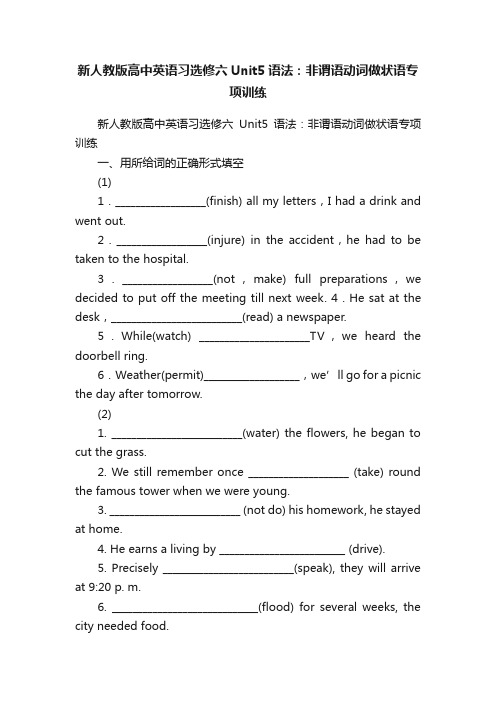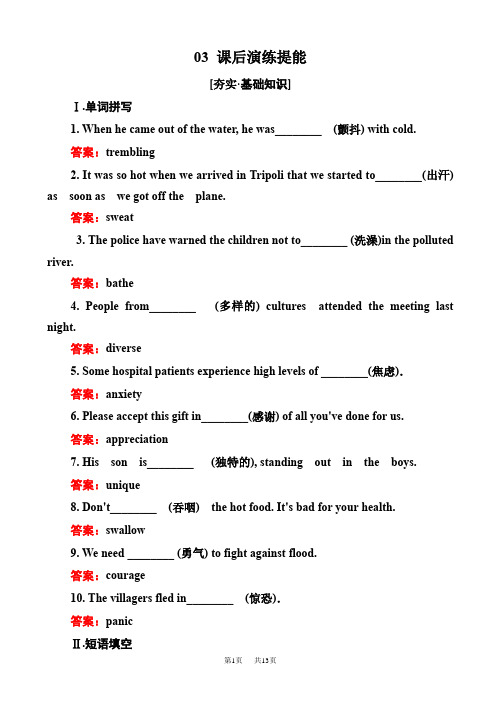高二英语(选修六)unit5语法练习
人教版新课标高中英语 2019-2020学年 选修 六 Unit 5 The power of nature Grammar 配套练习 含答案详解

Unit 5 The power of natureGrammarⅠ.句型转换1.Because he didn’t know how to deal with the problem, he turned to his teacher for help.→, he turned to his teacher for help.(用分词结构)2.If you go there by plane, you can arrive there in time for tomorrow’s important meeting.→, you can arrive there in time for tomorrow’s important meeting.(用分词结构)3.Though we had tried our best, we lost the game.→, we lost the game.(用分词结构)4.Those people usually sit together outside on a sunny day to enjoy the bright winter sunshine.→Those people usually sit together outside on a sunny day, .(用分词结构)5.Since the weather is sunny, let’s go for a picnic.→, let’s go for a picnic.(用独立主格结构)Ⅱ.用所给词的适当形式填空1.She sat there silently, (think) about what to do next.2.(watch) the play, she couldn’t keep back her tears.3.A lorry broke down in Bond Street, (cause) a massive traffic jam.4.(invite) him here to speak, we’d better go to his lec ture.5.(not collect) all the necessary material, she can’t begin to write her report.Ⅲ.句型训练1.(一般说来), women live longer than men.2.(向右转), you will find the post office you’re looking for.3.(假如你又一次失败), don’t get disappointed, but try again.4.(被忽视) for a long time, the boy sitting at the back of the room felt bored and went out.5.He sent me an e-mail, (希望得到进一步的信息).Ⅳ.读后续写阅读下面短文,根据所给情节进行续写,使之构成一个完整的故事。
新人教版高中英语习选修六Unit5语法:非谓语动词做状语专项训练

新人教版高中英语习选修六Unit5语法:非谓语动词做状语专项训练新人教版高中英语习选修六Unit5语法:非谓语动词做状语专项训练一、用所给词的正确形式填空(1)1.__________________(finish) all my letters,I had a drink and went out.2.__________________(injure) in the accident,he had to be taken to the hospital.3.__________________(not,make) full preparations,we decided to put off the meeting till next week. 4.He sat at the desk,__________________________(read) a newspaper.5.While(watch) ______________________TV,we heard the doorbell ring.6.Weather(permit)___________________,we’ll go for a picnic the day after tomorrow.(2)1. __________________________(water) the flowers, he began to cut the grass.2. We still remember once ____________________ (take) round the famous tower when we were young.3. __________________________ (not do) his homework, he stayed at home.4. He earns a living by _________________________ (drive).5. Precisely __________________________(speak), they will arrive at 9:20 p. m.6. _____________________________(flood) for several weeks, the city needed food.7. _____________________________ (fall) ill worried my parents.8. _____________________________ (hear) the news, they all jumped with joy.9. Our town has dozens of factories, several saw mills _________________________ (include).10. The suggestion that the meeting be put off requires to ___________________________ (consider).(3)1. ______________________ (clean) the classroom, the students went to the playground to watch thefootball match.2. She is writing a letter to a friend of hers, ______________________ (invite) her to attend the meeting.3. The secretary worked late into the night, __________________(prepare) a long speech for the president.4. He is sitting in the study ______________________ (do) his homework.5. ______________________ (see) the film, he knew everything about it.6. ______________________ (be) ill, he didn’t go to school yesterday.7. Mary stood at the school gate, ______________________ (wait) for Betty.8. ___________________ (stop) our car, we found ourselves trapped in thick fog and couldn’t see clearly.(4)1. _______________ (see) from the mountain, we can see the river running through the city.2. I am looking forward to ________________ (see) you again.3. The boy was lucky enough to escape _________________(punish).4. I apologize to you for ____________________ (not tell) you the truth immediately.5. It’s no use _________________ (try) to make me believe you.6. The bottle __________________ (contain) the poison was sent to the laboratory.7. _______________ (lose) her new bicycle made Mary so upset.8. ______________ (receive) a reply, he decided to write again.9. We watched the army ________________ (march) down the street towards the park.10. To m’s ________________ (attend) the meeting made everyone there very happy.11. The teacher asked me __________________ (hand) in my homework.12. We don’t allow ___________________ (smoke), so you must go to the smoking room.13. We don’t allow you __________________ (smoke) here.14. Nobody is allowed ___________________ (smoke) here.15. ________________(interest) in the Koories for many years, I decided to learn their language.二.句型转换(1)1. Because he was ill, he didn’t go to school._______________________, he didn’t go to school.2. When she was walking along the street one day, she met an old friend of hers.________________________the street one day, she met an old friend of hers.3. If it is sunny, we’ll go for a picnic tomorrow._______________________________, we’ll go for a picnictomorrow.4. After she had finished her homework, the little girl began to watch TV.___________________________her homework, the little girl began to watch TV.5. Because they had been warned by the teacher, they didn’t make such mistakes._____________________________by the teacher, they didn’t make such mistakes.6. As it was a holiday, all the shops were shut.__________________________________________, all the shops were shut.7. When he was still a small boy, he went to France with his father._________________________________________, he went to France with his father.8. When autumn comes, swallows go to the south._______________________________, swallows go to the south.(2)1. When she heard the news, she burst into tears.__________ __________ __________, she burst into tears.2. As he wasn’t feeling well that morning, he went to see the doctor.__________ __________ __________ __________ __________, he went to see the doctor.3. While I was walking in the street, I ran into Sue.__________ __________ __________ __________, I ran into Sue.4. As the child had never seen a rainbow before, he was very excited.__________ __________ __________ a rainbow before, the child wasvery excited.5. Their car was caught in a traffic jam, and thus it caused the delay.Their car was caught in a traffic jam, __________ __________ __________.三.用非谓语动词把下面复合句和并列句改成简单句。
高二课本知识点详解及练习:选修6Unit5(人教版)

高二课本学问点详解及练习:选修6Unit5(人教版)Unit5 The power of nature学问点详解Ⅰ. 常考单词必背1.appoint vt.①任命;委派②指定;约定Committee members recently appointed me their chairman.委员会最近任命我为主席。
[快速闪记](1)appoint sb as/to be...任命某人担当……appoint sb to +职位任命某人担当……职位appoint sb to do...指定某人做……(2)appointment n.[C]约会;约定;预约;[C] & [U]任命;任职;职位by appointment通过预约make an appointment(with)(与……)约定appointed adj.指定的;约定的;受指派的2.evaluate vt.评估;评价;对……评价;鉴定We need to evaluate how well the policy is working.我们须要对这一政策产生的效果做出评估。
3.wave n.波浪;波涛vt.波动;挥手She waved a friendly greeting.她友好地挥手致意。
4.absolute adj.完全的;确定的;的确的;无条件的It was nearly an absolute agreement.这差不多是一个完备的协议。
absolutely/'æbsəluːtlI/adv.①确定地;完全地②无条件地It is absolutely the best building in town.这无疑是城里最好的建筑物。
5.suit n.[C](一套)衣服;套vt.(服装、颜色等)相配;合身;中……的意;合乎……的要求To students,you'd better choose the activities which interest you and suit you.对学生来说,你最好选择那些感爱好适合自己的活动。
人教版英语选修六Unit5 the power of nature(V-ing form)语法专项学

V-ing form 语法专项学生练习题1. Coming out of my house, I saw the volcano erupting.2. Having experienced earthquake before, I wasn ’t frightened.3. Working hard, you will surely succeed4. He lay in bed, reading a novel.5. Having been told many times, he still made the same mistake.6. The bus was held up by the snowstorm, thus causing the delay.7. Not knowing how to deal with the problem, he returned to the teacher for help.8. Not having receivedany reply, he decided to write another letter. 1.现在分词作状语时,若表示的动作或状态与谓语动词同时或几乎同时发生,用____________句;若发生的动作或状态发生在谓语动词之前,用___________句.2. 1--6中的现在分词短语在句中分别作___________状语、__________状语、___________状语、___________状语、___________状语、___________状语。
3.现在分词与句中主语为逻辑上的主动关系时用doing 或having done ; 为被动关系时用being done 或___________(如例句5).4.现在分词的否定形式是在其前加not ,形式为___________或___________(如例句7、8)The main topic: v-ing form as adverbialI. v-ing form as adverbial: point one1. I didn’t take much notice.2. 3. Having collected and evaluated the information, I help other scientists to predict where lava will flow next and how fast.4. special clothes form the observatory, we put them on before we went any closer.5. their potential.6. Having swallowed the fruit, the girl became pregnant and later gave birth to a handsome boy.7. Looking carefully at the ground, I made my way to the edge of the crater.用所给词的适当形式填空①____________(hear) the news, they immediately set off for the station.②__________ _ (finish) his homework, he helped his mother with the housework.③________ ___ (surround) for a month, the enemy had to give in.④(新课标卷Ⅰ)The sunlight is white and blinding, _______ ___(throw) shadows on the ground.⑤(新课标卷Ⅱ)I got to the office earlier that day, _______ ___(catch)the 7:30 train from Paddington.II. v-ing form as adverbial: point two现在分词作状语时表示时间、条件、原因、让步其结构相当于一个状语从句,因此可和时间、条件、原因、让步等状语从句转换。
选修六unit5语法学案

高二选修6 Unit 5 Grammar现在分词作状语一、语法感知对比下列两个句子,找出不同。
While I was walking along the street, I saw an accident.Walking along the street, I saw an accident.二、-ing 形式作状语的基本用法现在分词作状语可以表示时间、结果、条件、让步、伴随或方式等,且可以转换成相应的状语从句或并列句。
1.表示时间现在分词作时间状语,相当于一个时间状语从句。
看到这些老照片时,我想起了我的童年。
(see) the old photoes, I remembered my childhood.= the old photoes, I remembered my childhood. (时间状语从句)2.表示原因现在分词作原因状语,一般位于句首,相当于一个原因状语从句。
因为疲倦,我停下来休息。
(be) tired, I stopped to take a rest.= tired, I stopped to take a rest. (原因状语从句)3.表示条件现在分词作条件状语,一般位于句首,相当于一个条件状语从句。
向左走,你就会找到那个学校。
__________ (turn) to the left, you will find the school.= to the left, you will find the school.(条件状语从句)4.表示让步现在分词作让步状语,相当于一个让步状语从句。
尽管他知道我的住处,但从不来看我。
__________(know) where I live, he never come to see me .= where I live, he never comes to see me. (让步状语从句)5. 表示结果现在分词做结果状语,表示必然的结果,常位于句末,可以与句子主干一起转换成一个含有并列谓语的简单句。
高中英语人教版高二选修6练习:unit_5_the_power_of_nature_5-2 含解析

03 课后演练提能[夯实·基础知识]Ⅰ.单词拼写1. When he came out of the water, he was________ (颤抖) with cold.答案:trembling2. It was so hot when we arrived in Tripoli that we started to________(出汗) as soon as we got off the plane.答案:sweat3. The police have warned the children not to________ (洗澡)in the polluted river.答案:bathe4. People from________ (多样的) cultures attended the meeting last night.答案:diverse5. Some hospital patients experience high levels of ________(焦虑).答案:anxiety6. Please accept this gift in________(感谢) of all you've done for us.答案:appreciation7. His son is________ (独特的), standing out in the boys.答案:unique8. Don't________ (吞咽) the hot food. It's bad for your health.答案:swallow9. We need ________ (勇气) to fight against flood.答案:courage10. The villagers fled in________ (惊恐).答案:panicⅡ.短语填空vary from...to...,glance through,give birth to,have a gift for...,get into a panic,be anxious about,be rewarded with...,adiversity of...1. The situation________ slightly ________country ________country.答案:varies; from; to2. She________ very________the safety of her daughter.答案:is; anxious about3. The boy is very clever and ________ art.答案:has a gift for4. Everyone who reached the summit ________ a magnificent view.答案:was rewarded with5. She________ a baby last night.答案:gave birth to6. ________ the text and then answer the following questions.答案:Glance through7. The old man________ when he found the door was open.答案:got into a panic8. This nature reserve is home to________ rare plants and animals.答案:a diversity ofⅢ. 完成句子1. I________________________his safety when I heard the news of the train accident.当我听到火车事故的消息时,我很担心他的安全。
高二英语选修六_Unit5_单元语法详解

Unit5 单元语法详解动词-ing形式1. 构成形式一般式:doing被动式:being done完成式:having done(表示发生在谓语之前的动作)被动完成式:having been done否定式:都是在动词-ing形式前面加not,包括独立主格结构。
2. 语法作用(1)动名词作主语:Swimming is my favorite sport. 游泳是我最喜欢的运动。
Learning new words is very useful to me. 学新单词对我很有用。
有时用it作形式主语,把动名词置于句尾。
It's nice meeting you. 很高兴见到了你。
(2)动名词作宾语:The teacher suggested making a plan. 这位老师建议制订计划。
①接动名词作宾语的常用动词有:admit; appreciate; avoid; delay; enjoy; escape; finish; imagine; mind; miss; practise; risk; suggest; keep; advise; forbid; allow; consider; dislike; resist等。
例如:I'm considering making a plan. 我在考虑制订一个计划。
He admitted having stolen the cat. 他承认偷了那只猫。
②接动名词作宾语的常见短语有:get down to; stick to; pay attention to; look forward to; object to; lead to; be/get used to; be/get accustomed to; adjust to; devote…to… ; feel like; insist on; put off; give up等。
人教版高中英语选修6课后习题 Unit 5 Section Ⅲ— Grammar

Unit5ThepowerofnatureSectionⅢ—Grammar课后篇巩固提升一、变式训练1.Because I was tired,I stopped to have a rest.= ,I stopped to have a rest.2.Because I had experienced a few earthquakes before,I wasn’t frightened.= a few earthquakes before,I wasn’t frightened.3.If you turn to the right,you will find a path leading to his cottage.= ,you will find a path leading to his cottage.4.Because I had spent all night watching the game,I was very tired the next day.= all night watching the game,I was very tired the nee out of my house,I saw my father planting trees in the garden.= my house,I saw my father planting trees in the garden.二、根据汉语意思,用动词-ing形式(短语)完成下列句子1.由于生病,我不得不待在家里。
,I had to stay at home.2.他把咖啡杯掉在了地上,摔得粉碎。
He dropped the coffee cup to theground, .3.过马路的时候要小心些。
When ,please be careful.4.听到这个消息我们都高兴地跳了起来。
,we all jumped with joy.5.完成作业后,杰克外出散步了。
- 1、下载文档前请自行甄别文档内容的完整性,平台不提供额外的编辑、内容补充、找答案等附加服务。
- 2、"仅部分预览"的文档,不可在线预览部分如存在完整性等问题,可反馈申请退款(可完整预览的文档不适用该条件!)。
- 3、如文档侵犯您的权益,请联系客服反馈,我们会尽快为您处理(人工客服工作时间:9:00-18:30)。
(2)V—ing 所表示的动作与谓语表示的动作几乎同时发生。 如果分词表示的动作发生在谓语所表示的动作之前,则用 动词V—ing 形式的完成式( having done)
eg. Writing the letter ,he left out something important.
be equal to 胜任的、等于
• point to指向、表明
see to 注意、处理
• be used to 习惯于 devote oneself to 献身于
• be familiar to 为……熟悉
• 一些固定的-ing分词短语,如 • generally speaking(一般来说), • judging from…(根据……来判断), • considering…(考虑到……), • talking of…(谈到……,提到……)等等
• ⑤-ing分词间或也可作条件状语和让步状语 • 如果你站在大山的脚下会发现自己很渺小。 • Standing at the foot of a high mountain,you
will find himself very small. • 尽管知道了一切情况,他们还是要我赔偿损失。
• Knowing all this, they made me pay for the damage.
1.I cannot understand _____ such a well-paid job.
A. him to give up
B. him to have given up
• ==》 They stood there for half an hour and watch the stars in the sky.
• 年轻人跟在老人的后面开始慢慢地走起来。
• Following the old man, the young people started walking slowly.
4. “Can’t you read?” Mary said ____ to the notice.
A. angrily pointing
B. and point angrily
C. angrily pointed
D. and angrily pointing
5. The murderer was brought in, with his hands ____ behind his back. A. being tied B. having tied C. to be tied D. tied
--ing分词做状语: • -ing分词作状语可以表示时间、原因、结果、
条件、让步、方式或伴随情况等。 • ①-ing分词短语作时间状语,有时可由连词when,
while引出。如:
• Be careful while/when crossing the road. • 当看到那些画,她想起了她的童年。
A.an underground lake was discovered B.there was an underground lake discovered C.a lake was discovered underground. D.the workers discovered an underground lake
• Seeing those pictures, she remembered her childhood. ==》When she saw ------
• ②-ing分词短语作原因状语,
• Not knowing his address, I can’t send this book to him.
A. Not receiving
B. Receiving not
C. Not having received
D. Having not received
3.The visiting Minister expressed his satisfaction with the talks, ____ that he had enjoyed his stay here. A. having added B. to add C. adding D. added
• ==》Although they knew all this , they made me pay for the damage.
注:(1) 分词作状语时,它的逻辑主语与主句的主语一致。
V--ing表主动或进行,--ed 表完成或被动.
• _L_o_o_k_in_g_(look)out of the window ,we can see a big tree.
C.Having lost D.Losing
12—Why do you stand and watch the milk__D_over?
---Oh,sorry.I was thinking of ___to the zoo.
A.boiling;taken B.boiled;taking
C.boiled;being taken D.boiling;being taken
分词作状语
1.European football is played in 80 countries, ____ it the most
popular sport in the world.
A. making B. makes
C. made
D. to make
2.____ a reply, he decided to write again.
C.Having written carelessly
D.Being written carelessly
6.__B__several times,the young scientist still kept
On making his experiments. A.Having been failed B.Having failed C.Though failed D.Because of failure
• ⑥“with/without+n.+-ing”结构在句中作状语, 表示伴随情况或时间、原因等。如:
• 随着时间的推移,他的头发变花白了。
• His hair became grey with the years passing. • 因为期末考试快到了,他感到很紧张。
• With final-exams coming, he feels very nervous.
• 常见的带介词to的短语,后接-ing或名词。
• admit to承认
contribute to捐助、贡献
• get down to着手做
give way to让位于
• keep to 坚持、遵守 lead to 导致
• look forward to期待 turn to 求助于
• stick to坚持
( while/when he was writing the letter) Having written the letter, he read it carefully. (After he had written the letter)
(3) 否定式not的位置 (在分词的最前面加not)
Not knowing her address,we could not get in touch with her. Not having received an answer, he decided to write another letter to them.
A.Finished B.Having finished C.Finishing D.To finish
3._B__who she was,she said she was Mr.Johnson’s
friend.
A.Asking B.Asked C.To be asked D.When asking
Choose the best answer:
1.She is writing a letter to a friend of hers,_B___him
to the party .
A.Having invited B.inviting C.to invite D.invited
2.__B__all my letters,I had a drink and went out.
• 英语中习惯接-ing分词作宾语的常见动词:
• 避免 错过 少延期 avoid miss put off/postpone
• 建议 完成 多练习 suggest finish practise • 喜欢 想象 禁不住 enjoy imagine can’ help • 承认 否定 与嫉妒 admit deny envy • 逃避 冒险 莫原谅 escape risk excuse • 忍受 保持 不介意 stand keep mind
9.Finding her car stolen,___D__.
A.a policeman was asked to help
B.the area was searching thoroughly
C.it was looked for everywhere
D.she hurried a policeman for help
• She was so angry that she threw the toy on the ground, breaking it into pieces.
• ④-ing分词作伴随状语,可放于句首或句中。表 示主语的另一个伴随的动作。如:
